EASI-EXTRACT® BIOTIN
0,01 €EASI-EXTRACT® Biotin immunoaffinity columns for use in conjuntion with an HPLC or LC-MS/MS system for detection of biotin in a wide range of commodities.
A lot of foods are fortified with vitamins, for example juices, dairy products, baby food, cereals, sweets, tablets and vitamin mixtures. To measure the exact concentration of vitamins in food, R-Biopharm offers a wide portfolio of test systems.
According to the laboratory equipment (whether an HPLC device or a microwell photometer is available), detection can be carried out with the instrumental method (HPLC, LC-MS/MS) in combination with immune affinity columns (EASI-EXTRACT®) for pre-purification and concentration of the samples. Depending on the sample preparation, the added vitamin content or the total vitamin content can be determined. If a microwell photometer is available, there is the option of either an ELISA (RIDASCREEN®) or a microbiological test system (VitaFast®).
In order to establish an adequate vitamin supply for the public, food, feed and pharmaceutical products are being fortified with vitamins on a more frequent level. This is usually done by mixing or spraying so called pre-mixes into the product. The foundation of analysis is to check if legal regulations are being followed and if the declared vitamin content is indeed in the product and if marketing claims of the producers are justified. The availability of analytical methods that delivery fast and accurate results when testing the vitamin content of products is therefore absolutely necessary.
On 22nd of November 2011, the food information order (LMIV) has been published in the official gazette of the EU. The new duties to inform about certain ingredients is included in the new publication. The vitamin contents marked on the label must correspond to the end of the minimum durability date in the food, feed and pharmaceutical products.
According to recommendations of the society of German chemist (GDCh), the tolerance for vitamins of group 3 (vitamin A, D, E, folic acid, vitamin B12 and Biotin) may be up to 30 % of the declared content, the tolerance for vitamins of the group 2 (vitamin B1, B2, B6, pantothenic acid, Niacin and vitamin C) is 20 % of the declared content.
Hence, it is necessary that manufacturers as well as supervision authorities control vitamin contents.
Vitamins strengthen the immune system, enable the body to use other nutrients, complement as enzymes, detoxify the organism and reduce the cardiac infarction risk. They are essential for our energy production and influence metabolism reactions without changing. Even low vitamin contents have a substantial effect. Nevertheless, under certain circumstances a vitamin deficiency can occur.
Vitamins are present in foods and foodstuffs of plant and animal origin. They are divided into two basic groups: fat-soluble vitamins and water-soluble vitamins. The fat-soluble vitamins are stored in the body what can lead in the most favorable case to a stock storage and therefore a constant supply could be superfluous. However, this profit can lead to health problems. Water-soluble vitamins, on the other hand, generally are not stored in the body, but are eliminated soon after consumption. Consequently, a regular intake of these vitamins is necessary. Only vitamin B12 can be stored in the liver.
There are a total of 13 vitamins and four, A, D, E and K are fat-soluble and the others, vitamins of the B group and vitamin C, are water-soluble. Because the body is unable to synthesize most of these essential organic compounds, therefore it is vital to ingest the vitamins. Nonetheless, Vitamin D is an exception, because the body can form it with solar irradiation in the skin itself. Also Niacin can be formed from the amino acid tryptophane by metabolism.
Showing 1–16 of 22 results
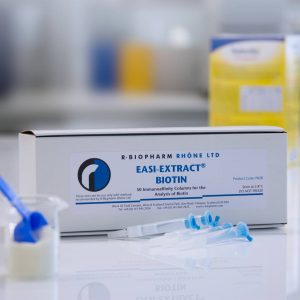
EASI-EXTRACT® Biotin immunoaffinity columns for use in conjuntion with an HPLC or LC-MS/MS system for detection of biotin in a wide range of commodities.
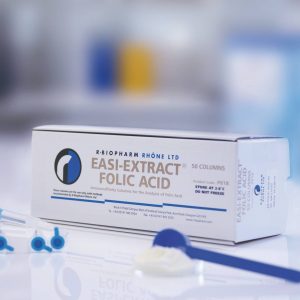
Immunoaffinity columns for use in conjunction with an HPLC or LC/MS-MS system for detection of folic acid in a wide range of commodities.
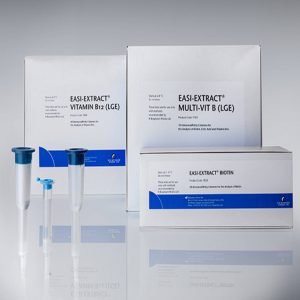
EASI-EXTRACT® MULTI-VIT B (LGE) immunoaffinity columns for use in conjunction with an HPLC or LC-MS/MS system for detection of biotin, folic acid and vitamin B12 in a wide range of commodities.
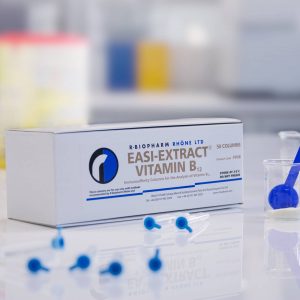
EASI-EXTRACT® VITAMIN B12 immunoaffinity columns for use in conjunction with an HPLC or LC-MS/MS system for detection of vitamin B12 in a wide range of commodities.
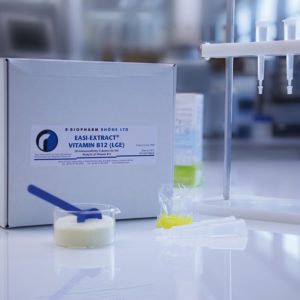
Immunoaffinity columns for use in conjunction with an HPLC or LC-MS/MS system for detection of vitamin B12 in a wide range of commodities.
RIDASCREEN®FAST Vitamin B12 is a competitive enzyme immunoassay for the quantitative determination of vitamin B12 in milk, milk powder, food for special medical purpose, grain and cereals, fortified flour, vitamin powder, -mixture, -tablets, and vitamin juice.
RIDASCREEN®FAST Folic acid is a competitive enzyme immunoassay for the quantitative determination of added folic acid in milk, milk powder, food for special medical purpose, grain and cereals, fortified flour, vitamin powder, -mixture, -tablets and vitamin juice.
Chicken pancreatin (γ-glutamylhydrolase) for the enzymatic treatment of food and animal feed to determine the natural folic acid content. Chicken pancreatin is used for the enzymatic treatment of food prior to the determination of its natural folic acid content. The natural folic acid is hydrolysed with chicken pancreatin into folylmonoglutamate or folyldiglutamate. Chicken pancreatin is ideal for microbiological folic acid determination in microtiter plate format (VitaFast®). It is also suitable for the determination of the natural folic acid content using other methods.
The VitaFast® Vitamin B1 (Thiamine) microtiter plate test is a microbiological method for the quantitative determination of total vitamin B1 (added and natural vitamin B1) in food, animal feed and in pharmaceutical products. The microbiological test system is in accordance with international norms.
The VitaFast® Vitamin B12 (Cyanocobalamin) microtiter plate test is a microbiological method for the quantitative determination of total vitamin B12 (added and natural vitamin B12) in food and in pharmaceutical products. The microbiological test system is in accordance with international norms.
VitaFast® Vitamin B12 (Cyanocobalamin) standard for the use of spiking food, feed and pharmaceutical products.
The VitaFast® Vitamin B2 (Riboflavin) microtiter plate test is a microbiological method for the quantitative determination of total vitamin B2 (added and natural vitamin B2) in food, animal feed and in pharmaceutical products. The microbiological test system is in accordance with international norms.
The VitaFast® Vitamin B3 (Niacin) microtiter plate test is a microbiological method for the quantitative determination of total niacin (added and natural niacin) in food, animal feed and in pharmaceutical products. The microbiological test system is in accordance with the international norms.
The VitaFast® Vitamin B5 (Pantothenic Acid) microtiter plate test is a microbiological method for the quantitative determination of total pantothenic acid (added and natural pantothenic acid) in food, animal feed and in pharmaceutical products. The microbiological test system is in accordance with the international norms.
VitaFast® Vitamin B5 (Pantothenic Acid) Spiking Standard standard for the use of spiking food, feed and pharmaceutical products.
The VitaFast® Vitamin B6 (Pyridoxin) microtiter plate test is a microbiological method for the quantitative determination of total vitamin B6 (added and natural vitamin B6) in food, animal feed and in pharmaceutical products. The microbiological test system is in accordance with international norms.